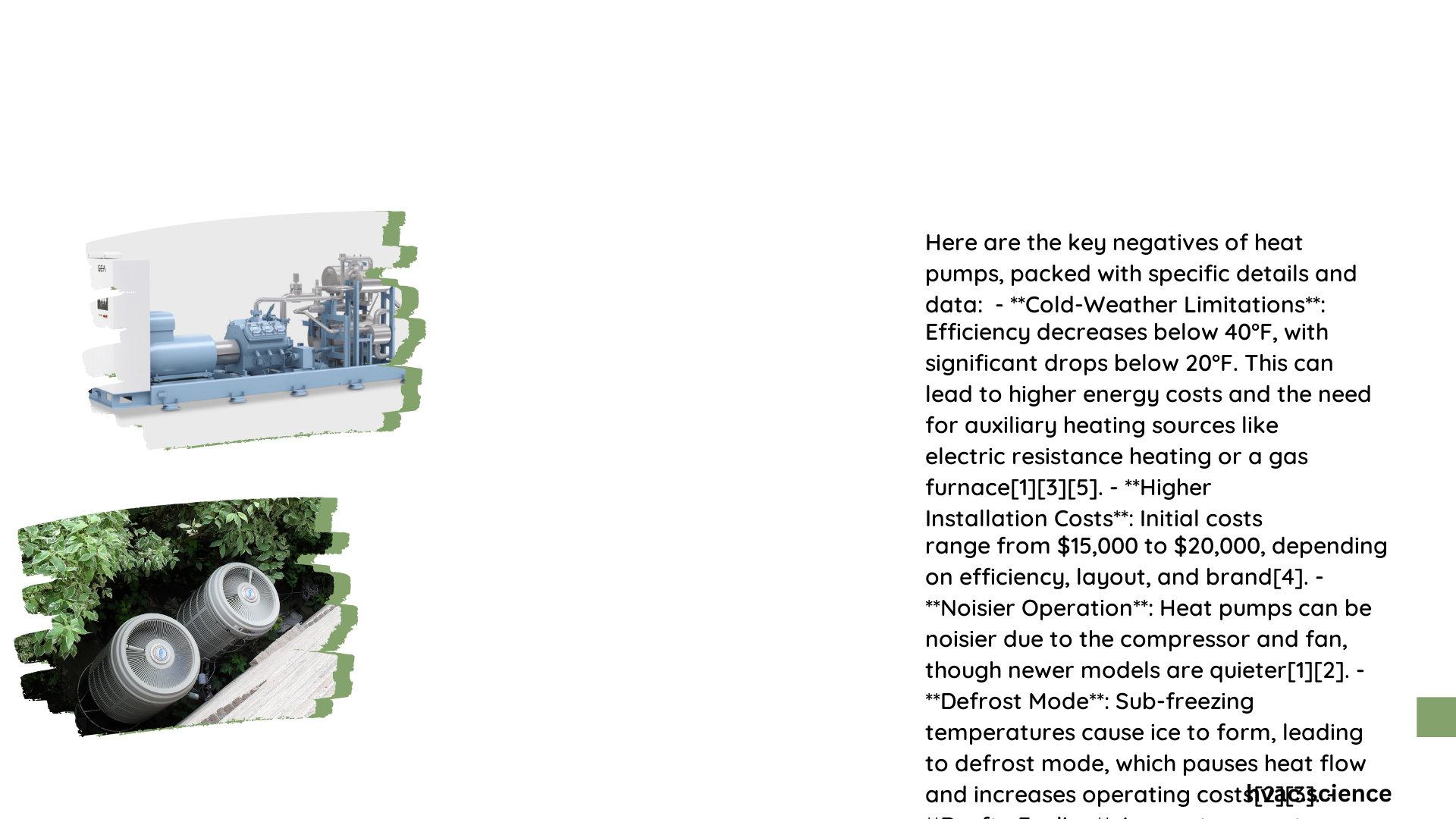Heat pumps, while efficient and eco-friendly, come with their share of drawbacks. These include decreased efficiency in extreme temperatures, high initial costs, potential noise issues, and ongoing maintenance requirements. Understanding these negatives is crucial for homeowners considering heat pump installation, as they can impact both comfort and long-term expenses.
What Are the Main Efficiency Issues with Heat Pumps?
Heat pumps face several efficiency challenges, particularly in extreme weather conditions:
-
Performance in Cold Climates: Heat pumps struggle to maintain efficiency when outdoor temperatures drop significantly. Below freezing, their Coefficient of Performance (COP) can fall below 1.0, making them less efficient than traditional electric heaters.
-
Energy Consumption Spikes: During very cold periods, heat pumps may rely on auxiliary electric resistance heating, leading to increased energy consumption and higher utility bills.
-
Reduced Cooling Efficiency: In extremely hot weather, heat pumps may struggle to cool homes effectively, potentially leading to comfort issues and increased energy use.
How Do Performance Metrics Reflect These Issues?
Heat pump efficiency is measured using several metrics:
- Heating Seasonal Performance Factor (HSPF): Measures heating efficiency over a typical season. Higher values indicate better performance.
- Seasonal Energy Efficiency Ratio (SEER): Measures cooling efficiency over a season. Again, higher values are better.
- Energy Efficiency Ratio (EER): Measures cooling efficiency at a specific outdoor temperature (95°F).
| Metric | Good Rating | Excellent Rating |
|---|---|---|
| HSPF | 8.2 – 9.0 | 10.0+ |
| SEER | 14 – 16 | 18+ |
| EER | 11 – 12 | 13+ |
These metrics can help homeowners understand potential efficiency issues, but they don’t always reflect real-world performance in extreme conditions.
What Are the Average Maintenance Costs for Heat Pumps?

Heat pumps require regular maintenance to operate efficiently, which can be a significant ongoing expense:
- Annual Professional Maintenance: Costs range from $100 to $300 per year.
- Filter Replacement: $20 to $100 annually, depending on filter type and frequency of change.
- Refrigerant Recharge: $200 to $600 if needed.
- Major Repairs: Can range from $500 to $2,000 for issues like compressor failure.
What Is the Frequency of Required Maintenance Tasks?
- Monthly: Check and clean air filters
- Bi-annually: Professional inspection and cleaning
- Every 5-10 years: Replace major components like compressors or fan motors
These maintenance requirements can be a significant drawback for homeowners looking for low-maintenance heating and cooling solutions.
How Do Noise Complaints Affect Heat Pump Users?
Noise is a common complaint among heat pump users, particularly in residential settings:
- Compressor Noise: Can range from 40 to 60 decibels, similar to normal conversation or background music.
- Fan Noise: Typically 30 to 50 decibels, but can be higher during high-speed operation.
- Defrost Cycle: Can produce sudden, loud noises that may disturb sleep or quiet activities.
What Are the Impacts on Residential Living Conditions?
- Sleep Disturbance: Outdoor units placed near bedrooms can disrupt sleep patterns.
- Outdoor Living Spaces: Noisy units can make patios or gardens less enjoyable.
- Neighbor Complaints: In densely populated areas, heat pump noise can lead to disputes with neighbors.
While newer models are generally quieter, noise remains a significant negative aspect of heat pump ownership for many users.
What Environmental Concerns Are Linked to Heat Pumps?
Despite their reputation for eco-friendliness, heat pumps do have some environmental drawbacks:
- Refrigerant Leakage: Although modern refrigerants are less harmful to the ozone layer, leaks still contribute to greenhouse gas emissions.
- Manufacturing Impact: Production of heat pumps involves energy consumption and resource use, contributing to their overall carbon footprint.
- Electricity Source: The environmental benefit of heat pumps depends heavily on the cleanliness of the electricity grid they rely on.
How Do Regulatory Compliance Issues Affect Heat Pump Users?
- Efficiency Standards: Heat pumps must meet minimum efficiency standards, which can limit choices and increase costs for consumers.
- Refrigerant Regulations: Changing regulations on refrigerants may require future upgrades or replacements.
- Installation Requirements: Strict installation codes can increase initial costs and limit placement options.
These environmental and regulatory factors can add complexity and cost to heat pump ownership, representing significant negatives for some potential users.
What Are the Initial Cost Barriers for Heat Pump Installation?
The high upfront cost of heat pumps is a major drawback for many homeowners:
- Equipment Costs: A quality heat pump system can cost $5,000 to $15,000 or more.
- Installation Fees: Professional installation can add $2,000 to $5,000 to the total cost.
- Potential Home Modifications: Some homes may require electrical upgrades or ductwork modifications, further increasing costs.
How Do These Costs Compare to Traditional HVAC Systems?
| System Type | Average Cost Range |
|---|---|
| Heat Pump | $7,000 – $20,000 |
| Furnace | $2,500 – $6,000 |
| Central AC | $3,500 – $7,500 |
While heat pumps can offer long-term savings, their high initial cost is a significant negative factor for many homeowners, especially those with limited budgets or short-term residency plans.
In conclusion, while heat pumps offer many benefits, their negatives – including efficiency issues in extreme temperatures, high maintenance costs, noise concerns, environmental impacts, and substantial upfront costs – are important factors to consider. Homeowners should carefully weigh these drawbacks against the potential benefits when deciding on their heating and cooling solutions.
References:
1. https://www.cec.coop/measuring-the-efficiency-of-heat-pumps-and-air-conditioners/
2. https://daikinatlantic.ca/2022/02/02/how-to-measure-heat-pump-performance-with-efficiency-ratings/
3. https://green-energy-efficient-homes.com/heat-pump-efficiency.html
